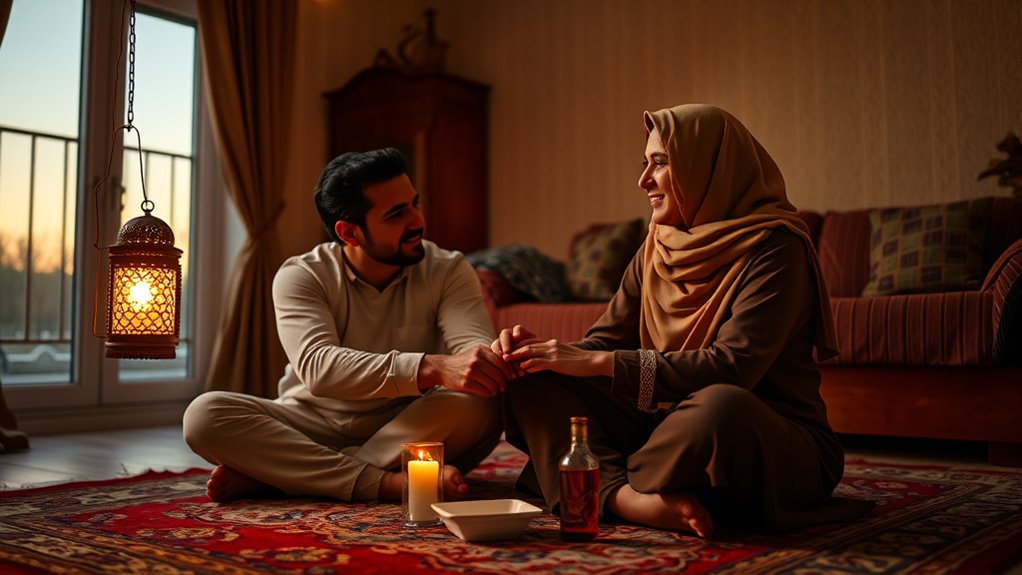During Ramadan, the fasting period acts as a stress test for your relationship, revealing both strengths and areas needing growth. You may find your patience tested as fatigue and hunger impact communication and emotional resilience. However, this shared challenge also offers an opportunity to strengthen your bond through better understanding, mindfulness, and support. If you want to learn how to turn these obstacles into growth moments, there’s much more to discover below.
Key Takeaways
- Ramadan exposes relationship strengths and weaknesses, highlighting areas needing improved communication and emotional resilience.
- Shared routines during fasting foster understanding, patience, and empathy between partners.
- Managing stress and fatigue during Ramadan encourages couples to develop patience and tolerance.
- Navigating challenges together deepens emotional bonds and promotes constructive conflict resolution.
- Spiritual reflection during Ramadan enhances mindfulness, leading to more harmonious interactions beyond fasting hours.

Have you ever wondered how Ramadan can strengthen your relationships? During this holy month, you’re likely to face various challenges that test not only your faith but also your connection with loved ones. One of the most significant hurdles is steering communication challenges. When you’re fasting, your energy levels may dip, patience can wear thin, and misunderstandings might arise more easily. These moments can create tension if you don’t consciously work to maintain open, honest communication. However, Ramadan also offers a unique opportunity to develop emotional resilience. As you confront these difficulties together, you learn to manage stress and stay calm under pressure. This emotional strength becomes a foundation that can deepen your bond, helping you handle conflicts more constructively.
Through shared routines like Suhoor and Iftar, you and your partner often spend more time together, which can enhance your understanding of each other’s needs and feelings. Yet, it’s also common to encounter frustrations, especially when physical hunger or fatigue influence your mood. Recognizing these emotional responses and choosing to respond with patience and empathy can transform potential conflicts into moments of growth. Ramadan encourages you to be more mindful of your emotions and to approach your partner with compassion, which naturally promotes better communication. When you both acknowledge each other’s struggles, it fosters a sense of unity and mutual support that’s especially crucial during stressful times.
Shared routines like Suhoor and Iftar deepen understanding and foster patience during challenging moments in Ramadan.
Furthermore, the spiritual aspect of Ramadan can serve as a reminder to prioritize your relationship. Fasting is not just about abstaining from food; it’s an exercise in self-control and reflection. When you apply these principles to your interactions, you become more aware of how your words and actions impact your partner. This mindfulness helps you avoid unnecessary arguments and promotes more constructive conversations. Additionally, understanding the importance of color accuracy in home visuals can inspire you to be more precise in your own interactions, ensuring clarity and harmony. As you work through the emotional resilience needed to stay committed to your fasts and spiritual goals, you also strengthen your connection. You learn patience, tolerance, and humility—qualities that translate into a more harmonious relationship outside the fasting hours.
In essence, Ramadan acts as a stress test for your relationship, revealing both your strengths and areas for growth. It challenges you to communicate more effectively and build emotional resilience that lasts beyond the fasting month. As you steer these challenges together, you develop a deeper understanding and appreciation for each other’s struggles and virtues. This shared journey fosters a sense of solidarity and love that can carry your relationship to new heights long after Ramadan ends.
Frequently Asked Questions
How Does Fasting Influence Emotional Intimacy Between Partners?
Fasting can strengthen emotional intimacy between partners by encouraging emotional vulnerability and honest communication. As you both navigate hunger and discomfort, you may open up more, sharing feelings and fears. This shared experience can enhance support dynamics, making you more empathetic and connected. You might find that fasting pushes you to rely on each other emotionally, deepening your bond and fostering trust during challenging times.
What Are Common Conflicts Partners Face During Ramadan?
During Ramadan, you might face conflicts over cultural differences and family expectations. These can cause misunderstandings when partners have different traditions or views on fasting and celebrations. You may also struggle with balancing personal beliefs and family pressures, leading to disagreements. Open communication helps, so discuss your feelings and expectations honestly. Respecting each other’s backgrounds and finding common ground can ease tensions and strengthen your relationship during this spiritual time.
Can Ramadan Strengthen Relationship Trust and Communication?
Imagine your relationship as a garden, needing care and understanding to thrive. Ramadan’s fasting rituals act like a gentle rain, nourishing trust and communication between you. By embracing cultural differences and sharing experiences, you build deeper bonds. This sacred time challenges you to listen, empathize, and support each other, turning moments of fasting into opportunities for growth. Ultimately, Ramadan can strengthen your relationship by fostering patience, respect, and shared devotion.
How Do Couples Manage Intimacy Restrictions During Fasting Hours?
During fasting hours, couples manage intimacy restrictions by focusing on meaningful moments outside those times. You can deepen your spiritual connection through shared fasting rituals, prayer, and thoughtful conversations. This approach helps strengthen your bond by emphasizing emotional closeness and mutual understanding. By respecting the fast, you create space for spiritual growth, making your relationship more resilient and connected, even during periods of physical restraint.
What Role Does Shared Fasting Play in Relationship Bonding?
Think of shared fasting as a mirror reflecting your spiritual connection, much like cultural traditions that unite communities. When you fast together, it deepens your bond by fostering understanding, patience, and mutual respect. This shared experience acts as a silent dialogue, strengthening your relationship beyond words. Embracing these traditions allows you both to grow closer, creating a lasting sense of unity rooted in shared values and spiritual growth.
Conclusion
So, congratulations—you’ve survived Ramadan’s fasting frenzy and perhaps even your partner’s patience test. Who knew that a month of hunger and prayers could reveal your true relationship status? Maybe it’s time to thank fasting for exposing those cracks, or better yet, blame it for the chaos. Either way, when the month ends, at least you’ll know if your love can handle a little hunger-induced madness—or if it’s time to break the fast on something stronger.










